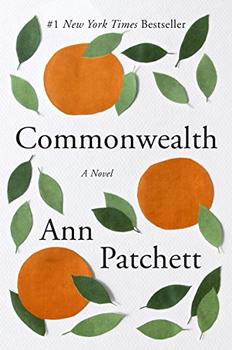Summary | Excerpt | Reading Guide | Reviews | Beyond the book | Read-Alikes | Genres & Themes | Author Bio

The acclaimed, bestselling author - winner of the PEN/Faulkner Award and the Orange Prize - tells the enthralling story of how an unexpected romantic encounter irrevocably changes two families' lives.
One Sunday afternoon in Southern California, Bert Cousins shows up at Franny Keating's christening party uninvited. Before evening falls, he has kissed Franny's mother, Beverly - thus setting in motion the dissolution of their marriages and the joining of two families.
Spanning five decades, Commonwealth explores how this chance encounter reverberates through the lives of the four parents and six children involved. Spending summers together in Virginia, the Keating and Cousins children forge a lasting bond that is based on a shared disillusionment with their parents and the strange and genuine affection that grows up between them.
When, in her twenties, Franny begins an affair with the legendary author Leon Posen and tells him about her family, the story of her siblings is no longer hers to control. Their childhood becomes the basis for his wildly successful book, ultimately forcing them to come to terms with their losses, their guilt, and the deeply loyal connection they feel for one another.
Told with equal measures of humor and heartbreak, Commonwealth is a meditation on inspiration, interpretation, and the ownership of stories. It is a brilliant and tender tale of the far-reaching ties of love and responsibility that bind us together.
Though not told in chronological order, the story unfolds organically, each chapter building to the climax. And if it weren’t for the fact that all her books enjoy the same organic quality I might credit that to Commonwealth's autobiographical inspiration. But Patchett just seems to know all of her characters so intimately, and they move in a world we recognize and say things we might given similar circumstances. Even their bad decisions – and there are many here – make sense at the time. She is a master who can create passages that will be with you for the rest of your life...continued
Full Review
(607 words)
This review is available to non-members for a limited time. For full access,
become a member today.
(Reviewed by Donna Chavez).
 Ann Patchett has said that her book Commonwealth, more than any of her others, is autobiographical. It seems close given what we know about her life from various sources.
Ann Patchett has said that her book Commonwealth, more than any of her others, is autobiographical. It seems close given what we know about her life from various sources.
The bare bones information is that she was born on December 2, 1963 in Los Angeles to nurse-turned novelist Jeanne Ray and Los Angeles police officer Frank Patchett. She has one older sister. Her parents divorced and her mother remarried, moving to Nashville, TN – Patchett's current home – when Ann was six years old. The marriage came with four additional step siblings.
 She is the survivor of twelve years of Catholic education and credits the Church, its teachings and nuns with being a tremendous influence – for good and ill – over her life ...
She is the survivor of twelve years of Catholic education and credits the Church, its teachings and nuns with being a tremendous influence – for good and ill – over her life ...
This "beyond the book" feature is available to non-members for a limited time. Join today for full access.

If you liked Commonwealth, try these:

by Ann Napolitano
Published 2024
From the New York Times bestselling author of Dear Edward comes a poignant and engrossing family story that asks: Can love make a broken person whole?

by Melanie Benjamin
Published 2024
Two sisters navigate the thrilling, euphoric early days of California surf culture in this dazzling saga of ambition, sacrifice, and the tangled ties between mothers and daughters.